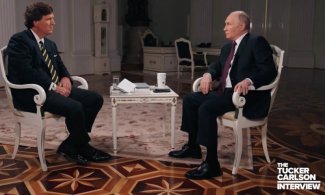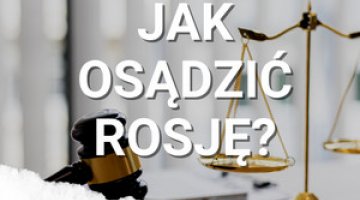Putin’s interview with Carlson: a message to Trump supporters

Tucker Carlson, the US ultra-conservative political commentator and ardent supporter of Donald Trump, conducted an interview with Vladimir Putin which aired on the night of 8–9 February Polish time. Russian propaganda has given wide publicity to this conversation as well as Carlson’s visit to Moscow.
Putin blamed the United States and NATO for causing the war in Ukraine, as has been his habit: he said that the conflict will end when the West stops supplying weapons to Ukraine, that sanctions are ineffective and that Russia will never be defeated. He repeated his words about the historical unity of the Russian and Ukrainian peoples, and claimed that the Poles had artificially created the idea of Ukrainian identity (see Appendix).
Commentary
- The interview bears the hallmarks of a wide-ranging Russian propaganda operation which has both internal and external objectives. Domestically, the Russian propaganda apparatus has used it to portray Putin as a leader whose opinion is heard and respected around the world, to boost optimism in society and within the elite, and to create the impression that Carlson acted as a kind of envoy for Donald Trump as the future US president. His victory in the 2024 US presidential election would be followed by a new opening in Russian-US relations, and the war would end on Russian terms thanks to the new administration’s pressure on Ukraine. At the same time, this message is intended for those sections of Western societies where war fatigue and scepticism about the wisdom of continuing support for Ukraine have been growing, and where a false ‘whataboutism’ and understanding of the Kremlin’s rationale have persisted.
- Putin did not openly offer support for Trump: he tried to keep his distance, and combined his criticism of the previous US administrations with recollections of his positive personal relations with some presidents, mentioning George Bush Jr. and Trump. However, some of his talking points aligned with Trump’s campaign slogans. He made several disapproving remarks about US policy in the spirit of anti-elitist populism. He alleged that the US is not run by the president but by his inner circle, claiming that US presidents have been dissuaded from entering into two “favourable” agreements with Russia, on the construction of a joint missile defence shield and on the Russian Federation’s membership in NATO. When asked whether the new administration could repair relations with Russia, he replied that the problem lies not with the leader, but with the mentality of the US ruling elite. Furthermore, he reiterated several times that he saw no point in talking to Joe Biden about how to settle the conflict: Russia did not provoke it, as it had always wanted peace. The US is responsible for the outbreak of the war and for supporting the Ukrainian military, so the onus should be on Washington to reach out to Russia with an offer.
- In this context, Putin’s remarks questioning the wisdom of US support for Ukraine are telling as they fit in with Trump’s campaign rhetoric and his isolationist-tinged message. There is no point in the US remaining involved in Ukraine as America is facing a host of its own problems: the situation at the border, migration and the national debt. Sanctions against Russia have been eroding the dollar’s position as the global currency, which goes against US interests. Negotiating with Russia, respecting its interests and seeking solutions would serve US interests better.
- According to Putin, the idea of US hegemony is dragging the country down; instead, the US should come to terms with the inevitable evolution of the world order in a direction that is unfavourable to the West. The US position will continue to weaken, and it is necessary to put a new generation in power – forward-looking people who are unencumbered by confrontational Cold War-era thinking. This was a clear reference to Trump’s idea of replacing the US elites in the name of supposed pragmatism and shifting the focus to domestic problems.
Appendix: the interview’s main points
Putin repeated his well-known claims about Russia’s supposed historical rights to Ukraine and the causes of the ongoing war, including Ukrainian “Nazism”, and as usual blaming NATO and the US for its outbreak. The West allegedly broke its promise to Russia not to expand NATO; the Alliance started to set up military bases in Ukraine, and CIA-inspired coups were staged there twice, in 2004 and 2014, with the aim of artificially severing the country’s ties with the Russian Federation. The West has always wanted to weaken and break up Russia, and the US had a plan to control the post-Soviet area in order to use it in its future struggle with China. Washington has supported separatists and terrorists in the North Caucasus, and violated international law to artificially halt the decline of its power in favour of new players.
Putin said, “Stop supplying weapons, then the war will end”, and added that if there is the political will, NATO will find a way to start negotiations with Russia (“the Alliance already wants them, it just doesn’t know how to make this happen”). Russia will never be defeated on the battlefield and the West is beginning to realise this. He concluded that Ukraine would eventually have to come to an agreement with Russia. Friendly relations between the two societies would be restored as the unity of the two peoples still endures.
Russia will not risk a global war or nuclear conflict (“this is absolutely out of the question”). Putin referred to the narrative that the US must support Ukraine’s war effort to avoid having to send its own troops there, calling it a “provocation”. If the US deployed its own regular troops to Ukraine, the world would be on the brink of a very serious global conflict.
Putin criticised Western sanctions, including the embargo on Russian gas imports, as part of the now customary form of pressure on Russia which in fact hurts the economic interests of Europe (mainly Germany).
He also declared that Russia wants a deal with Ukraine based on the provisions of the draft agreement the two sides reached in Istanbul in the spring of 2022. At that time, he said, UK Prime Minister Boris Johnson prevented President Volodymyr Zelensky from signing the document. The US and Poland also “wanted to fight Russia all the way to its end”.
On the issue of US journalist Evan Gershkovich, who was jailed in Russia on charges of espionage, causing outrage among the American public, Putin responded to Carson’s call for his release by saying that this would require an agreement between the two countries’ secret services. He clearly suggested that Russia expected to exchange Gershkovich for Vadim Krasikov, who was sentenced to life imprisonment by a German court in 2021 for the murder of the Chechen activist Zelimkhan Khangoshvili.
There were also references to Poland:
- Putin once again accused the Polish people of oppressing the Ukrainians in the past and seeking to Polonise them. He also claimed that Poland had collaborated with Hitler and bore joint responsibility for the outbreak of World War II. He insisted that the idea of the Ukrainians as a separate nation had originated in Poland.
- He denied that Russia intends to invade Poland (this is how the question was phrased). He also stressed that Russia has no interest in attacking “anyone” and claimed that NATO is deliberately demonising Russia and scaring Western societies with an “imaginary” threat from Russia in order to weaken it and coax taxpayers to support investments in weapons. The only scenario in which the Russian Federation could threaten Poland is “if Poland attacks Russia”.
- According to Putin, Polish mercenaries are the largest such force by nationality in Ukraine, followed by US and Georgian mercenaries.
- Poland has cut off supplies of Russian gas to Germany via the Yamal pipeline, even though Germany “feeds” it as the largest contributor to European funds.




